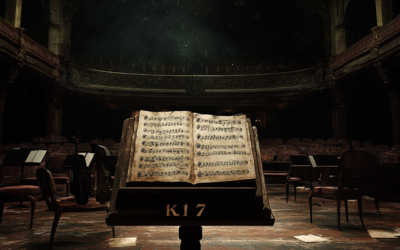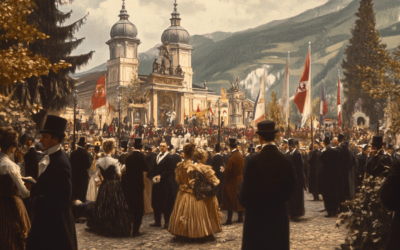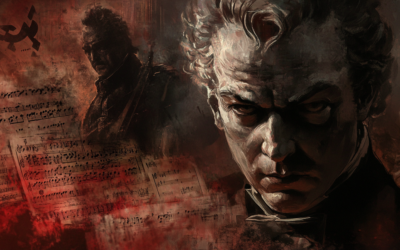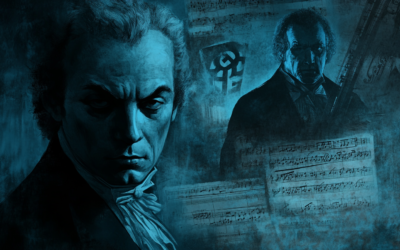The Myth of Mozart:
Debunking the Romantic Virtuoso Image
The image of Mozart as a Romantic-era virtuoso is a misleading anachronism, fuelled by 19th-century propaganda. Wolfgang was no transcendental pianist, but a product of an era where music was more galant than heroic.
Mozart: The Fall of the Gods
This book offers a fresh and critical look at the life of Wolfgang Amadeus Mozart, challenging the myths that have surrounded him for centuries. We strip away the romanticised image of the “natural genius” and delve into the contradictions within Mozart’s extensive biographies. Backed by nearly 2,000 meticulously sourced citations, this work invites readers to explore a deeper, more complex understanding of Mozart. Perfect for those who wish to question the traditional narrative, this biography is a must-read for serious music lovers and historians.
"Mozart’s brilliance was less about transcendental technique and more about the improvisational and expressive subtleties of the galant style."
Mozart: The Fall of the Gods
When we picture the young Mozart, many of us are drawn to the idea of a child prodigy touring Europe, dazzling audiences with his musical prowess. This image, however, is largely a fabrication. It has been shaped by Romantic ideals, associating Mozart with the virtuosos of the early 19th century and the great artists of the Romantic era. Yet, Wolfgang was not a 19th-century pianist whose feats of brilliance left audiences awestruck. Such an image is an anachronism.
The phenomenon of the virtuosic performer as we understand it today began only in the early 1800s. Figures like Paganini and Liszt came to embody the idea of superhuman performers, but this was long after Mozart’s time. By 1840, the piano and the virtuoso had become everyday realities. Mozart, however, belonged to a different era altogether.
Despite this, Wolfgang was later claimed as a symbol by Romantic-era virtuosos. Music publishers, eager to modernise his repertoire, transcribed his works for the piano—music originally written for the harpsichord. Young pianists practised the Minuets from Nannerl’s notebook, hoping to follow in Mozart’s footsteps. Yet, the 19th-century obsession with technical perfection and overcoming challenges was far removed from the world of 18th-century galant music.
“Mozart’s brilliance was less about transcendental technique and more about the improvisational and expressive subtleties of the galant style.”
His improvisational skills, highly praised in his time, were considered emblematic of an absolute and unparalleled mastery. However, this mastery had little to do with the virtuosic acrobatics of the Romantic pianist. It was about understanding and elaborating upon the galant compositions of composers like Telemann and Johann Christian Bach, both of whom had a direct influence on the young Wolfgang.
Mozart’s journey as a performer was marked by improvisation and ornamentation, not the transcendental feats of Romantic virtuosos. In fact, much of the technical brilliance that defined later centuries was still in its infancy during Mozart’s time. His early years as a musician saw him interpreting galant works, not composing transcendentally complex pieces. The romanticisation of Mozart’s abilities has led to a misinterpretation of his music and his era.
You May Also Like
Constanze Mozart’s Enduring Love
Although some have doubted her devotion, Constanze’s own words and actions illustrate a widow deeply committed to preserving Mozart’s legacy. Diaries, personal correspondence, and eyewitness testimony all challenge the notion that she neglected his memory—while the circumstances around his burial grow ever more perplexing.
A Revealing New Interview on His Thematic Catalogue
We’re excited to present a brand-new interview that challenges many of the long-held assumptions about Mozart’s Thematic Catalogue (1784–1791). Conducted by Swedish journalist Henry Grynnsten, this conversation delves into groundbreaking forensic techniques—like advanced ink analysis and digital image processing—that may change the way we view Mozart’s late works.
The Rattling Symphony: A Critical Take on K. 17
Often attributed to Mozart, the K. 17 symphony is anything but refined. Lacking orchestration and filled with gaps, it raises more questions than answers about its true authorship.
The Hidden Origins of the Salzburg Festival: A Nationalist Dream
The Salzburg Festival, far from being a mere celebration of Mozart’s genius, was born out of nationalist ambitions during a turbulent period in Austro-German history. Conceived by figures like Max Reinhardt, Heinrich Damisch, and Friedrich Gehmacher, the festival was deeply rooted in ultranationalistic ideals, transforming Mozart’s legacy into a tool for cultural dominance. The truth behind its founding has long been obscured, but the primary sources tell a different, darker story.
Mozart, Wagner, and the Nazi Myth
The Führer’s admiration for Wagner’s racially charged ideology not only influenced the policies of the Nazi regime but also reshaped the legacy of Mozart. Under National Socialism, Mozart was not celebrated as a universal genius but as a symbol of German purity and superiority. His music, stripped of its international influence, was rebranded as an expression of Aryan identity, intended to unify and inspire the German people.
Mozart, the Anschluss, and Nazi Propaganda
Following the 1938 Anschluss, the Nazi regime rebranded Mozart as the quintessential German composer, using his image to promote unity between Austria and Germany. The Salzburg Festival became a platform for Nazi propaganda, distorting Mozart’s legacy to fit their nationalistic and racial agenda.







